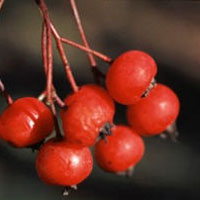Hawthorn
 © Steven Foster
© Steven FosterParts Used & Where Grown
Hawthorn is commonly found in Europe, western Asia, North America, and North Africa. Modern medicinal extracts primarily use the leaves and flowers. Traditional preparations use the fruit.
- Reliable and relatively consistent scientific data showing a substantial health benefit.
- Contradictory, insufficient, or preliminary studies suggesting a health benefit or minimal health benefit.
- For an herb, supported by traditional use but minimal or no scientific evidence. For a supplement, little scientific support.
Our proprietary “Star-Rating” system was developed to help you easily understand the amount of scientific support behind each supplement in relation to a specific health condition. While there is no way to predict whether a vitamin, mineral, or herb will successfully treat or prevent associated health conditions, our unique ratings tell you how well these supplements are understood by the medical community, and whether studies have found them to be effective for other people.
For over a decade, our team has combed through thousands of research articles published in reputable journals. To help you make educated decisions, and to better understand controversial or confusing supplements, our medical experts have digested the science into these three easy-to-follow ratings. We hope this provides you with a helpful resource to make informed decisions towards your health and well-being.
This supplement has been used in connection with the following health conditions:
| Used for | Amount | Why |
|---|---|---|
Congestive Heart Failure | 80 to 300 mg of standardized herbal extract two to three times per day with a doctor's supervision | Antioxidant hawthorn appears to reduce symptoms and improve exercise capacity by increasing blood flow to the heart and the strength of heart contractions, and reducing resistance to blood flow in the extremities.
|
Angina | 60 mg of an herbal extract containing 18.75% oligomeric procyanidins taken three times per day | Parts of the hawthorn tree contain flavonoids that may protect blood vessels from damage. Taking hawthorn extract improved heart function and exercise tolerance in angina patients in one trial. |
Cardiomyopathy and Congestive Heart Failure | 160 to 900 mg daily of a standardized herbal extract with a doctor's supervision | Studies have found hawthorn to be effective for the signs and symptoms of early-stage congestive heart failure, the main complication of cardiomyopathy. |
Hypertension | 500–1,200 mg per day | Hawthorn leaf and flower extracts have demonstrated mild blood pressure–lowering effects. |
Cardiac Arrhythmia | Refer to label instructions | Hawthorn has been used traditionally to reduce the frequency of arrhythmias. |
Traditional Use (May Not Be Supported by Scientific Studies)
Dioscorides, a Greek herbalist, reportedly used hawthorn in the first century A.D. Although numerous passing mentions are made for a variety of conditions, support for the heart is the main benefit of hawthorn.
Copyright © 2026 TraceGains, Inc. All rights reserved.
Learn more about TraceGains, the company.
The information presented by TraceGains is for informational purposes only. It is based on scientific studies (human, animal, or in vitro), clinical experience, or traditional usage as cited in each article. The results reported may not necessarily occur in all individuals. Self-treatment is not recommended for life-threatening conditions that require medical treatment under a doctor's care. For many of the conditions discussed, treatment with prescription or over the counter medication is also available. Consult your doctor, practitioner, and/or pharmacist for any health problem and before using any supplements or before making any changes in prescribed medications. Information expires December 2026.
